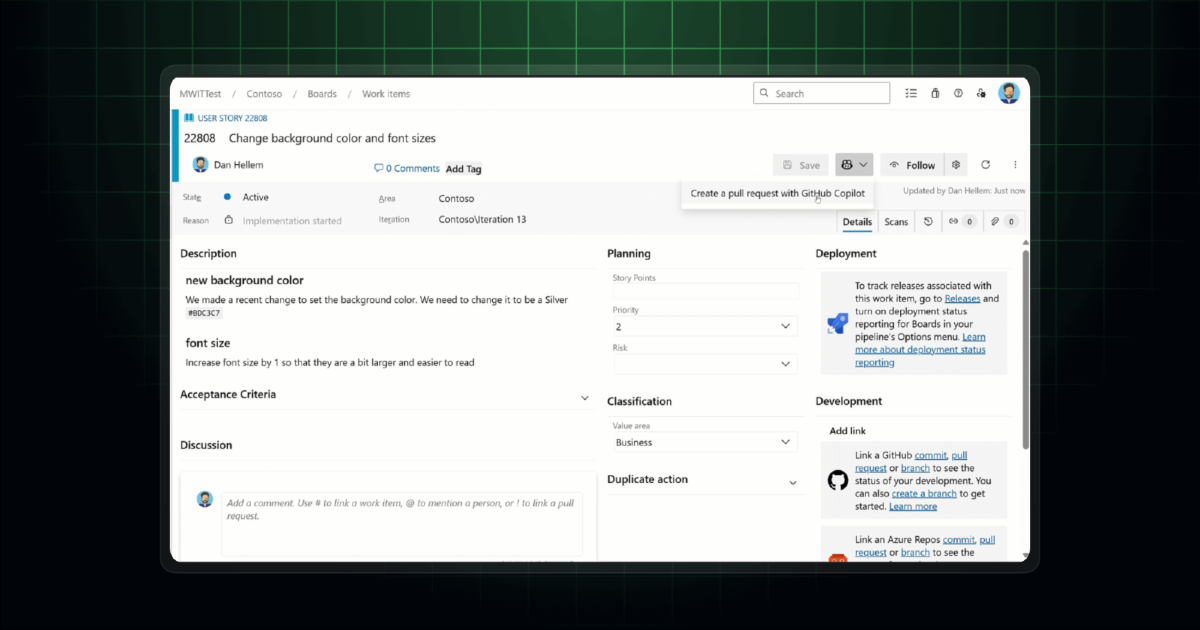Project management is about to get interesting.
You can now assign Azure Boards work items directly to GitHub’s Copilot coding agent, creating a direct line between Microsoft’s project management tooling and AI-powered development.
But this integration raises a fascinating question: What happens to team dynamics when some of your “teammates” are algorithms?
What this integration enables#
The Azure Boards-Copilot connection brings project management into the age of AI agents:
📋 Direct work assignment#
Project managers can assign Azure Boards work items to Copilot coding agents just like they would assign tasks to human developers.
🔄 Automated workflow bridging#
Work flows seamlessly from project planning in Azure Boards to AI-powered implementation through GitHub Copilot.
📊 Unified tracking#
Progress on AI-completed tasks appears in Azure Boards alongside human-completed work, creating a single view of project status.
⚡ Immediate execution#
Unlike human developers who might be busy or unavailable, AI agents can begin work on assigned items immediately.
The collaboration evolution#
This integration represents a subtle but significant shift in how we think about project teams:
From human-only to mixed teams#
Project managers now coordinate work between human developers and AI agents, requiring new skills in managing hybrid teams.
New forms of delegation#
The art of effective delegation extends beyond communicating with humans to understanding how to brief AI agents for optimal results.
Asynchronous by default#
AI agents don’t have office hours, vacation time, or meetings. They can work on project tasks around the clock, changing project timeline expectations.
The thoughtful implications#
What does it mean to manage a team that includes non-human members? Do we need new management approaches when some team members are algorithms?
How do we handle accountability when AI does the work? If Copilot completes a work item incorrectly, who’s responsible—the AI, the person who assigned it, or the person who reviewed it?
What happens to team cohesion when some work is done by teammates who don’t participate in team meetings, don’t have personal relationships, and don’t share the human experience of project pressure?
The psychology of AI teammates#
There’s something psychologically interesting about assigning work to AI:
Emotional distance#
It’s easier to assign difficult or tedious work to AI than to human colleagues. There’s no guilt about workload or concern about burnout.
Different expectations#
We might expect AI to work faster, never complain, and produce consistent quality—expectations we wouldn’t have for human teammates.
The empathy gap#
How do we maintain human-centered design and user empathy when increasing amounts of development work is done by AI that doesn’t have lived experience?
The efficiency question#
This integration promises significant efficiency gains:
- Immediate task pickup without scheduling delays
- No context switching between project management and development tools
- Consistent work quality without human variability
- 24/7 availability for urgent project items
But efficiency isn’t everything. Sometimes the “inefficiencies” of human collaboration—the discussions, debates, and relationship-building—are where the real value gets created.
What project managers need to learn#
Managing AI agents requires different skills than managing humans:
Clear specification#
AI agents need more precise, unambiguous instructions than human developers who can ask clarifying questions and make reasonable assumptions.
Quality assurance#
Understanding how to review AI-generated work and what kinds of errors to look for becomes a critical skill.
Human-AI coordination#
Orchestrating work between human developers and AI agents requires understanding the strengths and limitations of each.
Getting started#
The Azure Boards-Copilot integration is currently in public preview. If your organization uses both Azure Boards and GitHub Copilot, experiment with assigning straightforward, well-defined work items to AI agents.
Start with tasks that have clear acceptance criteria and don’t require significant creative problem-solving or stakeholder interaction.
We’re entering an era where project management becomes partially automated, and some of our teammates are algorithms. The question isn’t whether this will change how we work together—it’s how we’ll maintain the human elements that make great teams more than just efficient task-completion systems.
Get started: Learn more about assigning Azure Boards work items to Copilot and experiment with managing mixed human-AI development teams.


